Fashion loyalty programs can offset rising acquisition costs, reduce your reliance on discounts, smooth seasonality, weather economic downturns and gather valuable data.
The best fashion loyalty programs employ a mix of tactics to engage customers. Some offer points for purchases to increase repeat purchase rates. Others incentivize referrals and reviews to lower acquisition costs. Some use loyalty tiers to increase average spend and engage through non-financial incentives.
We’re going to look at 8 case studies of fashion loyalty programs. We’ll break down how they work, the results they’ve achieved, and why they’re so successful.
If you’d like to find out how your fashion brand can increase profits through a loyalty program, try our loyalty program ROI calculator.
In this guide:
- Why loyalty programs are so important for fashion brands
- The four man types of fashion loyalty program
- 8 examples of successful fashion loyalty programs
- The key elements of a fashion loyalty program
- 7 steps to creating your own fashion loyalty program
Why Fashion Loyalty Programs Matter
Before we dive into the specifics, let’s address the “why” behind fashion loyalty programs. These programs are not just a trend; they’re a strategic necessity in the fashion industry. And that’s because fashion brands face some unique challenges
1. High customer loyalty offsets rising acquisition costs
It’s expensive for fashion brands to bring in new customers. Average customer acquisition cost (CAC) for fashion brands is estimated at around $66.
Those brands who retain their customers through an effective loyalty program are less reliant on expensive acquisition of new customers.
Fashion loyalty programs can also be used to incentivize low-cost methods of bringing in new customers, such as referrals.
Our research suggests customers are happy to do this: 70% will leave a review to earn points; 61% will make a referral.
2. Non-financial rewards reduce the reliance on discounting
Fashion retailers are discounting 40% more than brands in other ecommerce industries.
Loyalty programs significantly reduce a brand’s reliance on discounting by providing alternative and more sustainable ways to incentivize and retain customers.
Nordstrom’s Nordy Club, for example, gives tier 2 loyalty program members (“Influencers”) priority access to style events. Tier 3 members (“Ambassadors”) have access to at-home stylists.
Our research shows customers value these kinds of benefits: 58% say invitations to exclusive in-store events are an important loyalty program benefit.
Brands that offer this kind of value have less need to discount and cut into their profit margins.
3. Customer loyalty smoothes seasonality
Loyalty program members tend to spend more than non-members, all year round. The promise of rewards encourages them to make repeat purchases, boosting your sales revenue even in the quiet periods.
This is valuable in the fashion industry, where seasonality can hit hard. Revenue naturally fluctuates at different times of year, and seasonal variance in demand for particular products creates stocking challenges.
4. Loyalty programs make your fashion brand more resilient to economic downturns
Demand is elastic in the fashion industry. When money is tight, shoppers buy fewer clothes (or cheaper clothes). This puts a lot of pressure on your pricing, creating a race-to-the-bottom that hurts profit margins.
According to our research, loyalty programs offset this impact. Active loyalty program members are 4x more likely to repeat purchase than non-members when confidence is low, and revenue from redeeming program members is nearly 3x more stable during economic uncertainty.
5. Loyalty programs gather valuable data
Loyalty programs gather data on customer preferences and behaviors, providing insights you can use to tailor your marketing strategies and product offerings.
The kind of personalization this data facilitates is important to any loyalty program: among shoppers we surveyed, 72% of Millennials consider personalized recommendations an important loyalty program benefit, and 71% of Gen Z.
When done right, a loyalty program sets your brand apart from the competition. It can be a key differentiator that helps you stand out in a crowded marketplace.
The four main types of loyalty program, and how they work for fashion brands
The benefits of your loyalty program will depend on the type of loyalty program you choose and the rewards you offer. The unique dynamics of the fashion industry make some types more suitable than others.
Points-based loyalty programs (“earn and burn”)
What it is: The “classic” loyalty program: customers earn points when they make purchases, and they can redeem those points for discounts on future purchases.
The benefits: Simple to administer and easy to plan — because you’re only giving out points for purchases, your loyalty program will almost always be profitable.
The drawbacks: Nothing major, but other kinds of loyalty programs can offer more innovative and profitable rewards.
Why it works for fashion loyalty programs: Loyalty points are great for fashion brands because they increase average order value. Customers will spend more if they get rewards for their spending down the line.
Value-based loyalty programs
What it is: A lot like points-based programs, but customers are also rewarded for doing things other than making purchases, like leaving a review or referring a friend.
The benefits: Incentivizing a wider range of positive behaviors can be more effective than simply giving out points for purchases. Incentivized referrals, for example, can be a great way to bring in new customers at low cost.
The drawbacks: Value-based loyalty programs need to be carefully calculated to make sure they’re profitable. Because all points can be redeemed for purchases, a poorly planned program can make a loss overall. This makes loyalty program management a little more complex than for an earn-and-burn program.
Why it works for fashion loyalty programs: The fashion industry thrives on social engagement — the Fashion subreddit has over 600,000 members — and social proof like reviews, so incentivizing social shares and reviews is a great way to structure a loyalty program. Just make sure your reward structure is ultimately profitable.
H&M give points for writing reviews and referring other loyalty program members. Pulse Boutique also gives 50 loyalty points for a review, which increases to 100 if the review includes a photo.
Tiered loyalty programs
What it is: Tiered loyalty programs involve levels of membership that offer increasing rewards and benefits the more a customer spends.
The benefits: Tiered loyalty programs are usually spend-based – spend $X and move into tier Y – so they’re a great way to increase average order values. Plus, offering exclusive and interesting rewards can play great on social channels.
The drawbacks: They can be complex to manage, and brands need to ensure the higher tiers offer genuinely enticing benefits to motivate customers to climb the ranks.
Why it works for fashion loyalty programs: Because they’re uniquely able to increase average order values, tiered loyalty programs are a great option for fashion brands. And, because fashion customers typically value things other than discounts, you can use loyalty tiers to offer non-financial incentives to your most valuable customers. Nordstrom’s Nordy Club, for example, gives priority access to to style events for tier 2 loyalty program members (“Influencers”) and access to an in-home stylist to tier 3 members (“Ambassadors”).
Paid (or “subscription”) loyalty programs
What it is: In subscription-based loyalty programs, customers pay an upfront or recurring fee to gain access to exclusive benefits. Amazon Prime is probably the most famous example.
The benefits: Guaranteed revenue from subscription fees and differentiation in price-sensitive markets from unique rewards, such as free shipping.
The drawbacks: The benefits need to be excellent to justify a subscription fee.
Why it works for fashion loyalty programs: Subscription loyalty programs are uncommon in the fashion industry. This is because they’re best suited to commodity markets in which brands can only stand out on price: consider booksellers, for example, who all ultimately sell the same books. Such loyalty programs are less common in the fashion industry, where products are differentiated and consumers are loyal to the products they like.
8 excellent examples of fashion loyalty programs
1. Nordstrom’s Nordy Club
Nordstrom’s Nordy Club is a well-known and successful loyalty program for several reasons:
Tiered Membership: The Nordy Club has a tiered system, including Member, Influencer, and Ambassador levels. This tiered structure offers escalating rewards and benefits as customers progress through the tiers, encouraging members to engage more with the brand to unlock higher-tier benefits.
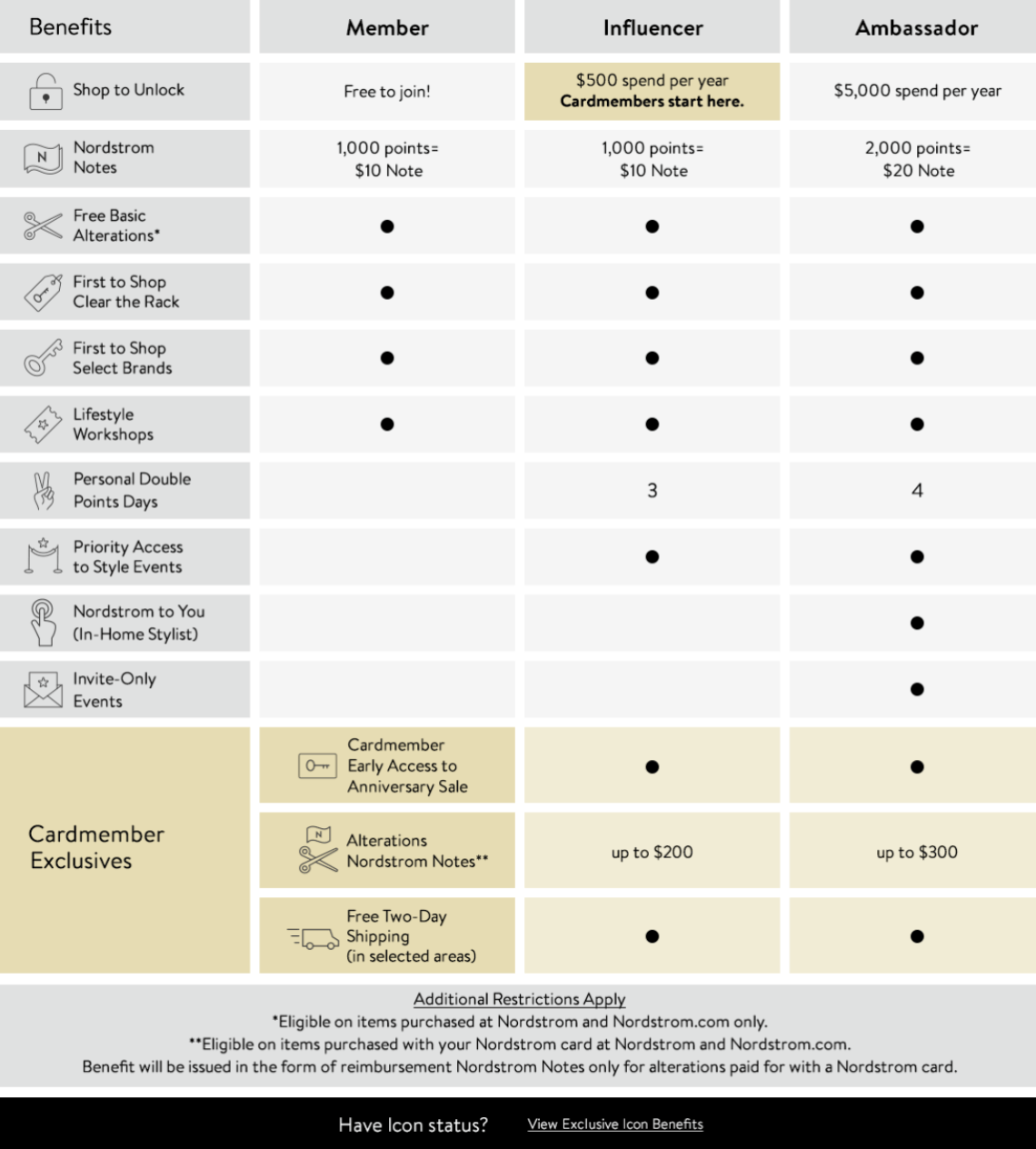
Exclusive Access: Members of the Nordy Club gain access to exclusive perks, such as early access to sales, private shopping events, and priority in-store services. These exclusives make members feel valued and special.
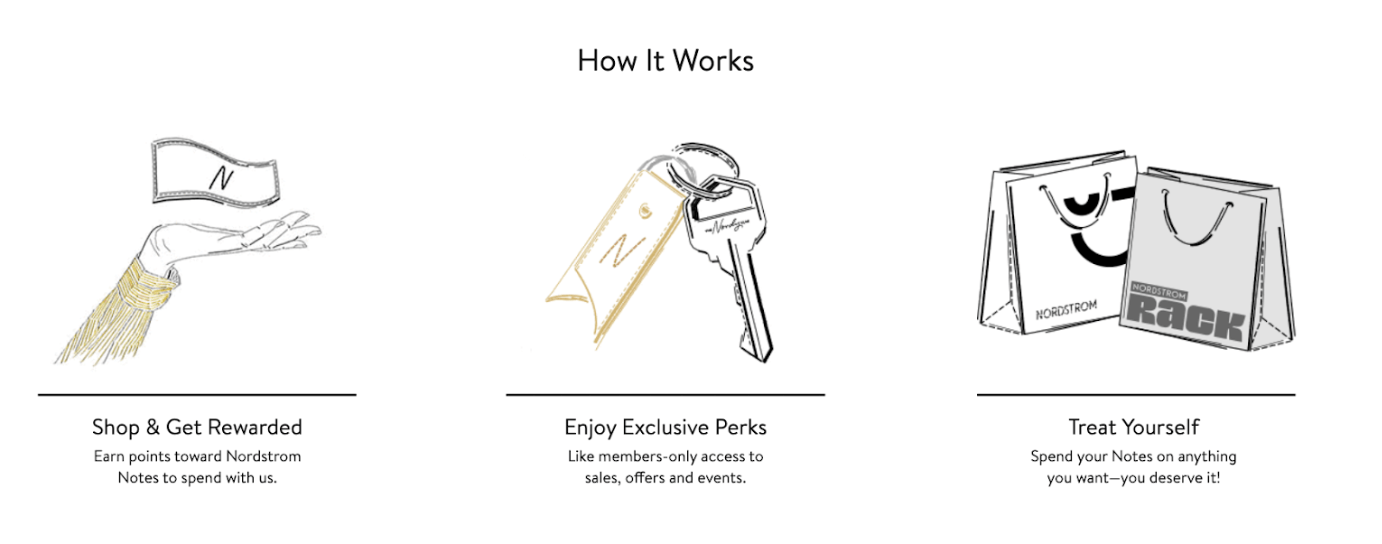
Personalization: The program offers personalized product recommendations based on members’ preferences and purchase history. This personal touch enhances the shopping experience and encourages members to return for more tailored selections.
2. Lululemon’s Membership Program
Lululemon is a yoga-inspired fashion brand, best known for luxury leggings and stylish athletic wear. Lululemon’s loyalty program caters to fitness enthusiasts, allowing its members to feel part of a real community. Here are some of the reasons the membership program is a success:
Exclusive Access: The program provides members with exclusive access to products and events, like the Lululemon Studio Classes. This exclusivity fosters a sense of belonging and makes members feel valued by the brand.
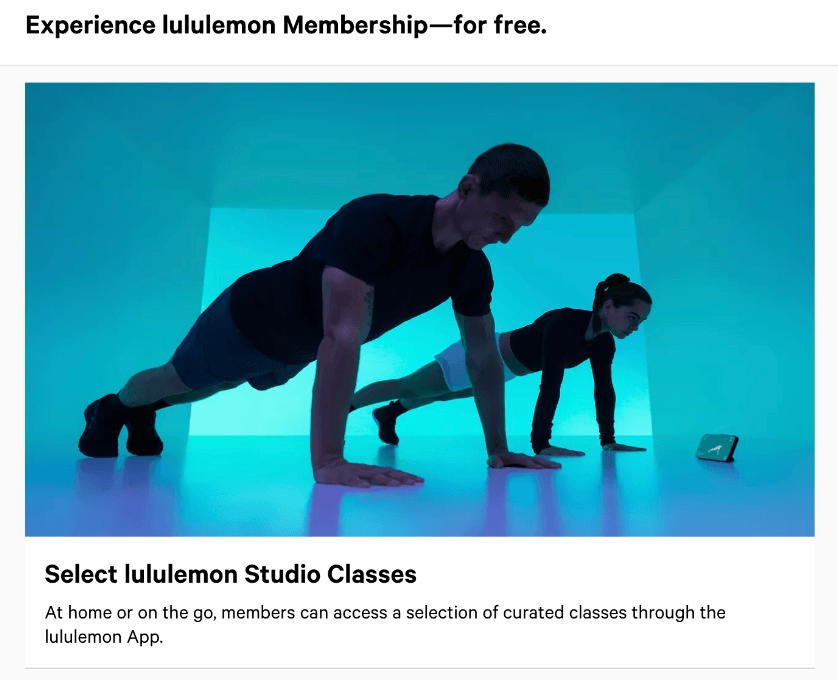
Community and Networking: Lululemon emphasizes community and networking among its members. This includes special events, workout sessions, and other activities that allow members to connect with like-minded individuals who share a passion for fitness and lifestyle.
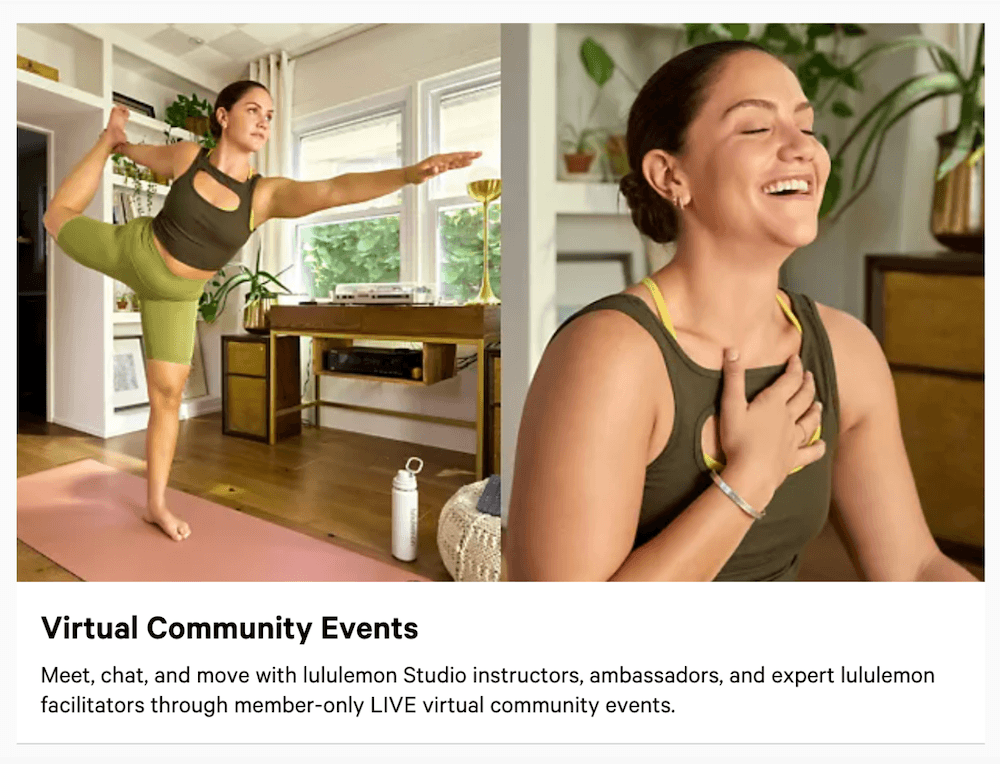
Brand Loyalty: The membership program encourages brand loyalty by offering ongoing benefits and rewards, such as receipt-free returns and free hemming. Members are more likely to continue shopping at Lululemon to take advantage of these benefits, reducing the likelihood of them switching to other activewear brands.
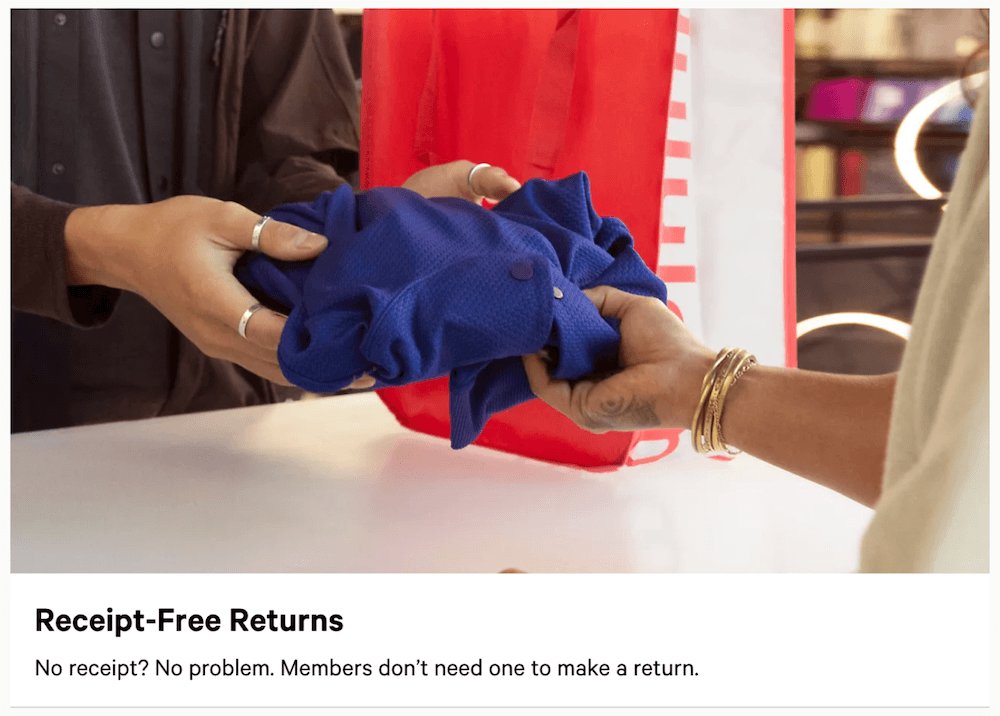
3. H&M’s Loyalty Program
H&M’s loyalty program provides a generous mix of discounts, early access, and sustainable fashion initiatives – which is why it does so well. Here are some of the reasons this program made the list:
Powerful Mobile App Integration: The H&M loyalty program is accessible via the H&M app or at hm.com. Integrating the membership program into the app makes it more convenient for members to access their benefits and regularly engage with the brand at the touch of a button.
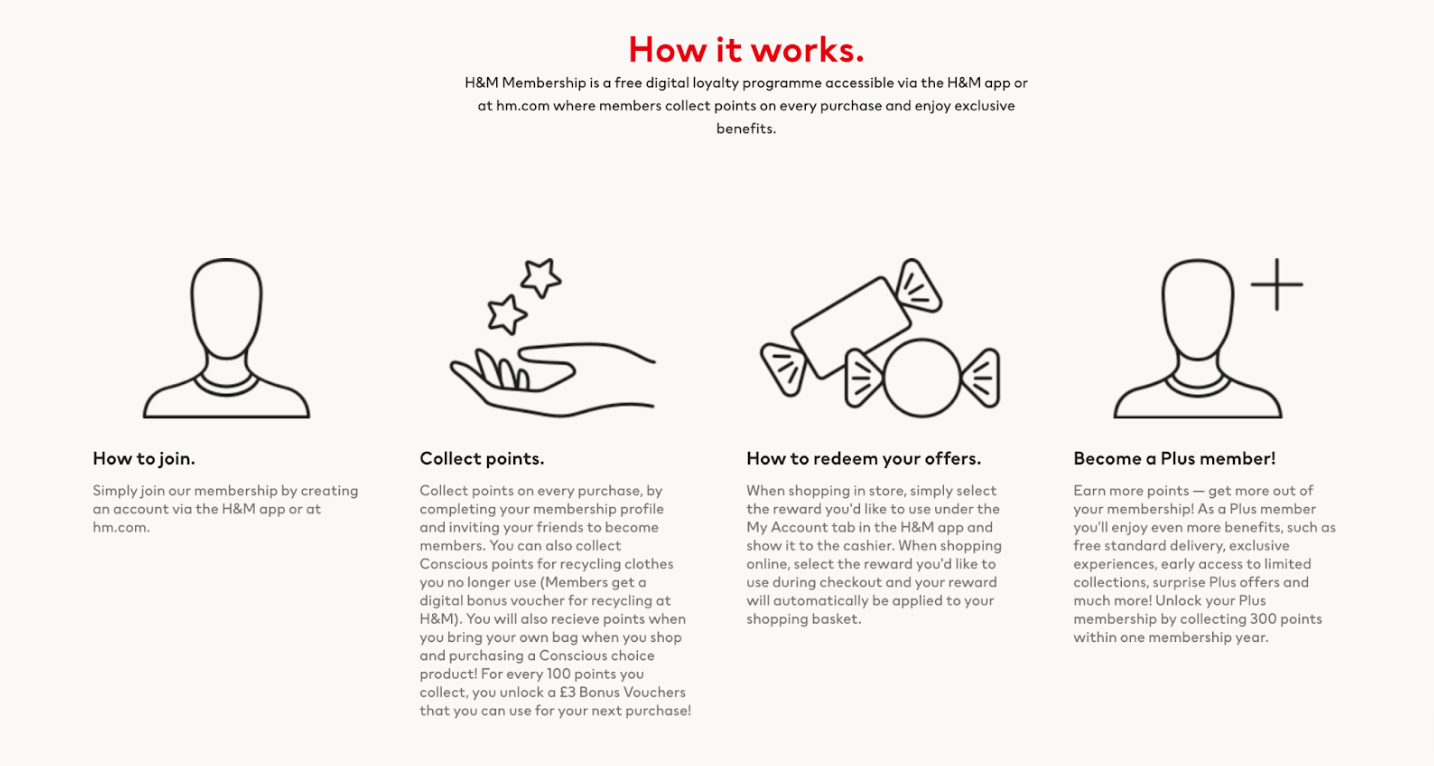
Free Delivery: H&M offers free delivery as a perk for members who spend over the $20 threshold. This is a great way to give value to loyal customers, while also increasing AOV by encouraging them to spend at least $20.
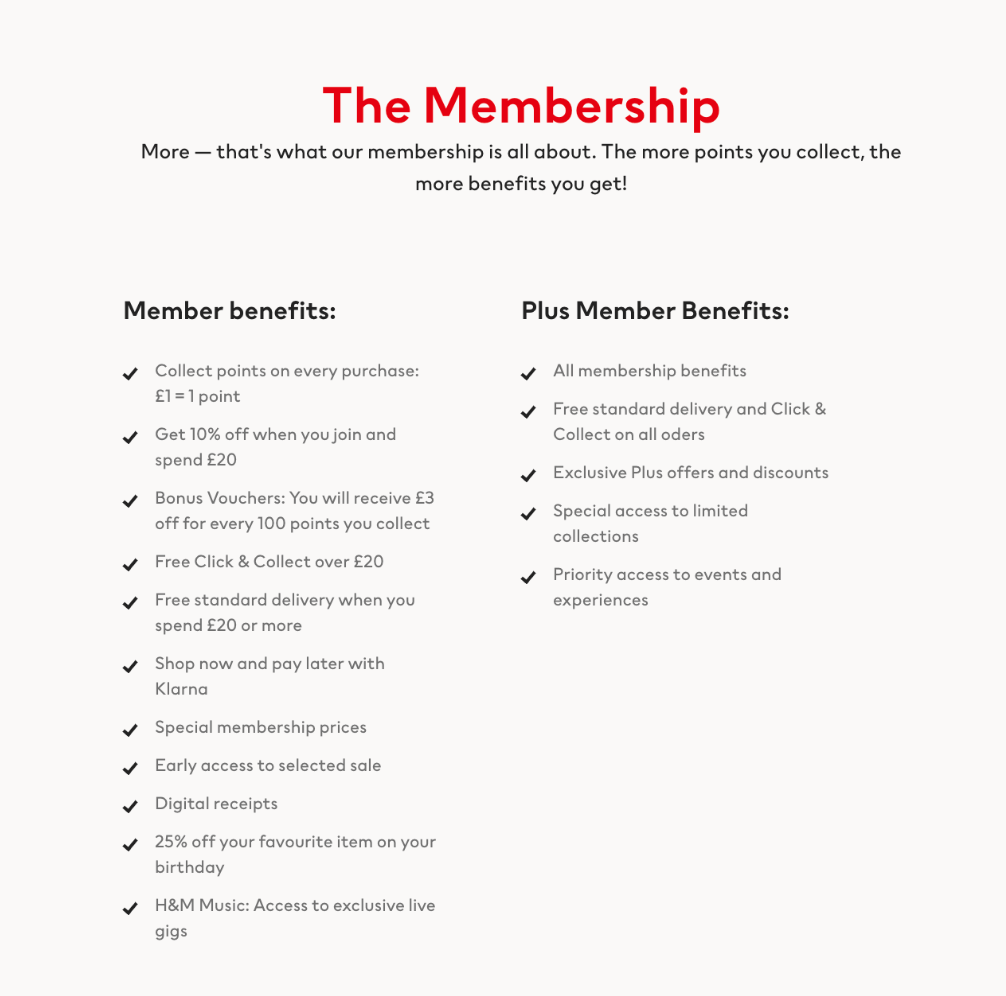
Experiential Rewards: As well as offering money-off vouchers and free delivery, H&M reward their members with exciting experiential perks, such as access to exclusive music events. These experiences make members feel special and valued while creating a highly emotional connection to the brand.
What sets these programs apart from the rest is their ability to offer value to customers beyond discounts. They create a sense of belonging and provide unique experiences that forge emotional connections.
4. Pulse Boutique’s “Pulse Perks”
Social proof is incredibly impactful. 84% of customers trust online reviews as much as personal recommendations. They act as validation beyond the standard sales imagery and allow customers to expel any doubts they may have before buying your products — such as sizing and quality.
Through their “Pulse Perks” loyalty program, Pulse Boutique rewards their devoted fan base 50 points for writing a product review. This encourages their already loyal customers to share their opinions and experiences which, in turn, helps new customers with their decision making.
But that’s not all. Pulse Boutique also rewards customers with 100 points if they add a photo to their review. A clever approach considering that 73% of customers say that the content within a review is more important to them than the overall star rating.
By featuring social proof site-wide, Pulse Boutique saw an 18% uplift in sales and a 39% increase in returning customers.
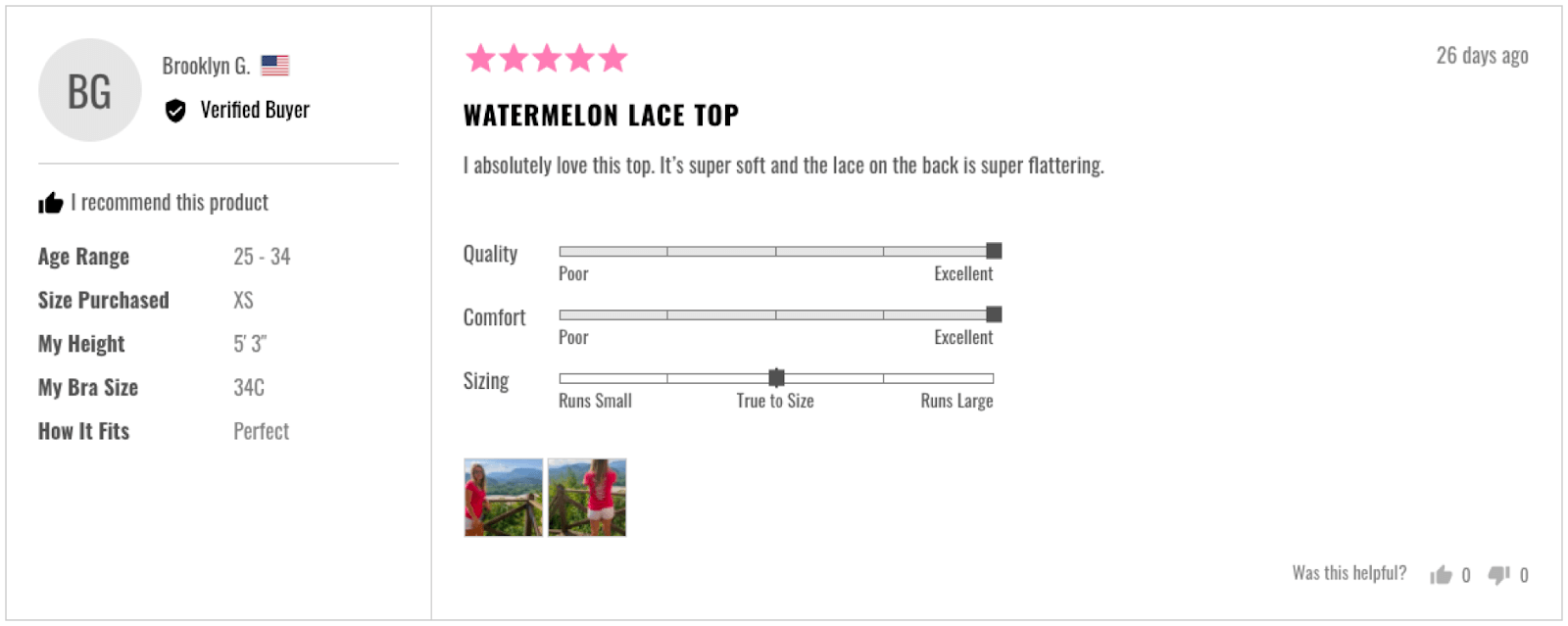
5. Lucy and Yak
Good fashion branding begins with coherent communication. And, with so many fashion brands out there, you need to make sure your customers clearly understand who you are and how they can relate to you.
After all, customers who are emotionally aligned with a brand are more engaged, and will more likely share their positive experiences. Through a loyalty program, you can tell your customers what you’re all about.
Lucy and Yak uses LoyaltyLion’s integrated loyalty program functionality to inject their personality throughout their loyalty page. They show the real people behind the actions customers can take on the page.
The sustainable dungarees company also shows that they’re a light-hearted, fun-loving brand. Their loyalty tiers are named, “Comfort Lover”, “Yak Enthusiast” and “Dungaree Devotee” — a fun nod to their products.
By incorporating their personality throughout their loyalty page, more customers will feel like they understand the brand on a deeper, more emotional level.
This is incredibly important considering that recent research concludes that emotion is the biggest driver of loyalty. And, that 70% emotionally engaged customers spend up to two times more with brands they’re loyal to.
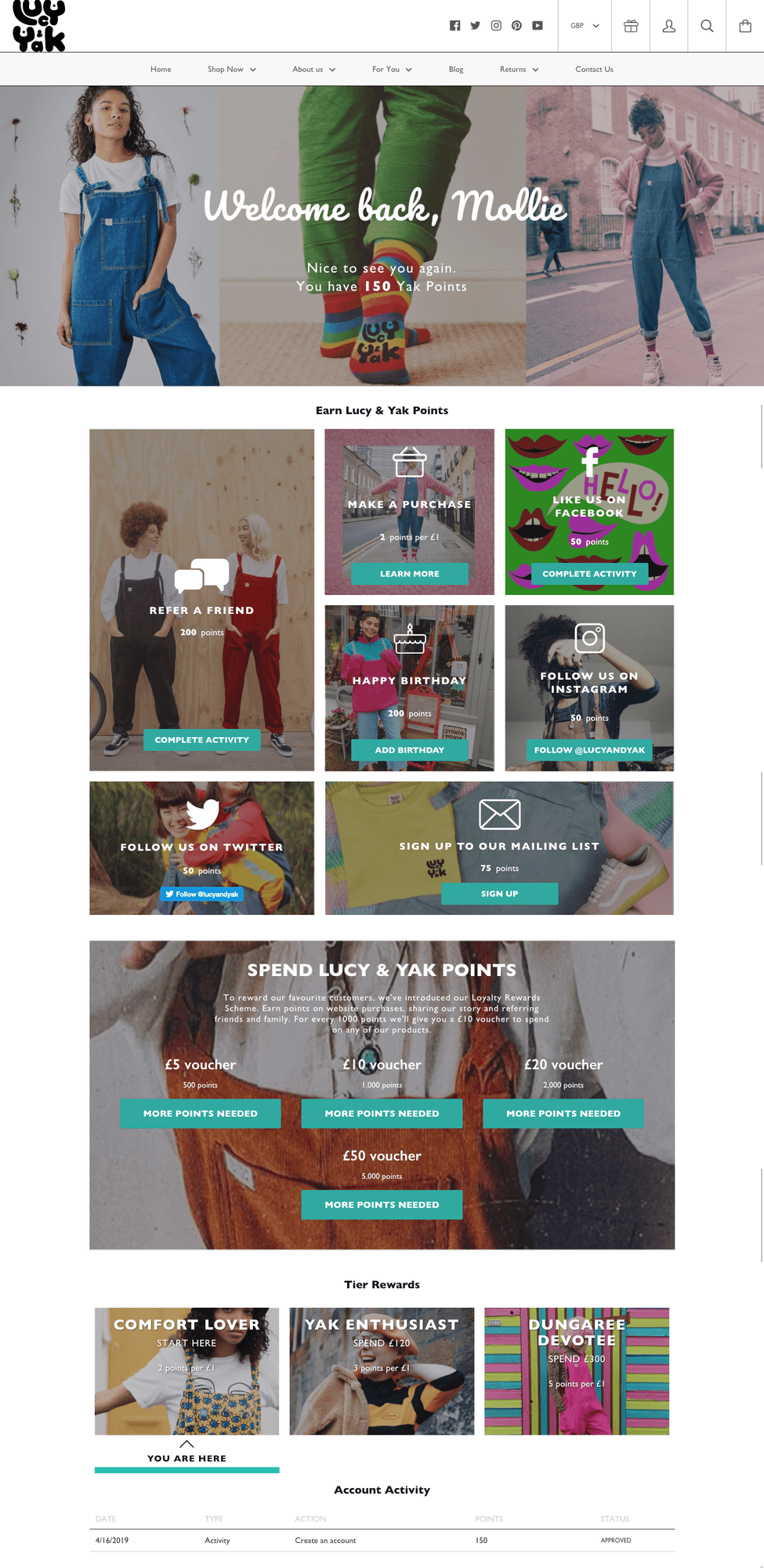
6. Taylor Stitch
Menswear brand Taylor Stitch uses its loyalty program as a way to encourage brand advocacy with two key strategies.
The first is to make referral the primary focus of their program. On their site, they have an eye-catching button that highlights how customers can receive a $20 voucher for every new customer they send Taylor Stitch’s way.
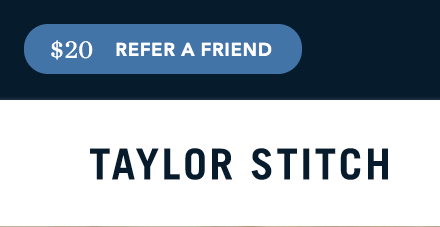
Once clicked, customers are taken to a page that explains the ins and outs of their community – otherwise known as “The Common Club”. Here they expand on the refer-a-friend offer and make it easy for customers to sign in and complete the action.
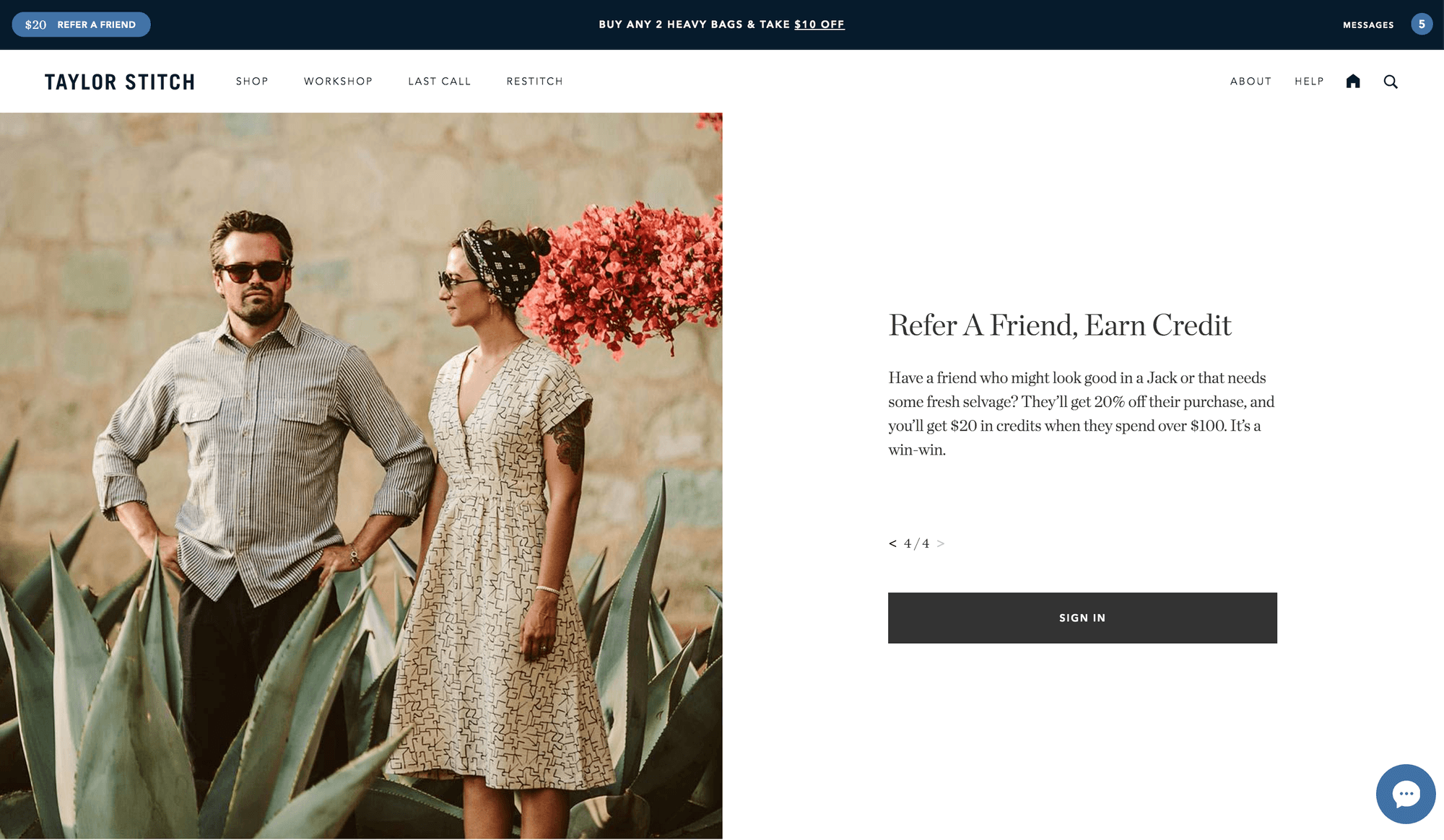
Referrals are vital for ecommerce success. Research shows that customers acquired through referrals spend 200% more than the average customer and are between 16 and 24% more loyal as they already trust that they’ll get a good experience.
The second way Taylor Stitch uses its loyalty program to encourage brand advocacy is in their welcome emails. Once a customer signs up to their loyalty program they clearly communicate their brand mission – “Responsibility built for the long haul” – and their focus on sustainability and fair working conditions.
By showcasing what they stand for at the outset, more loyal customers are likely to rally behind them and tell others about it.
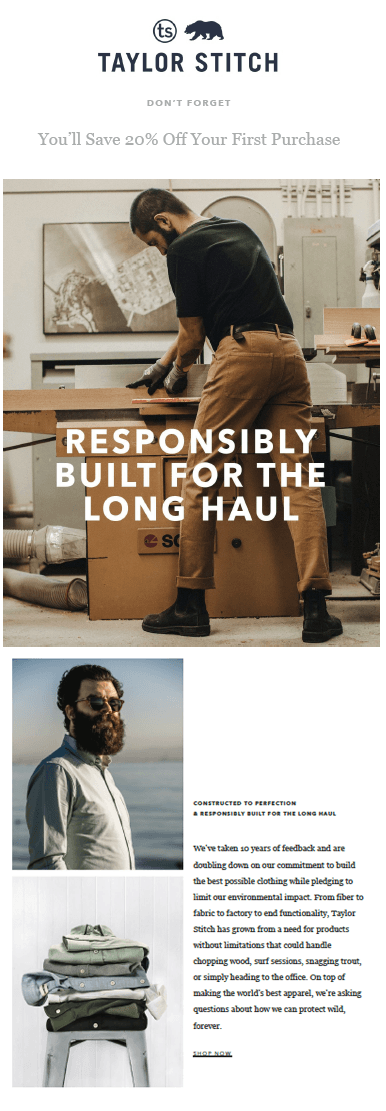
7. Abbott Lyon
While some retailers may think that discounts and rewards are a good way to get new customers through the door, they’re also a way to show gratitude to your existing customers.
And what better way to say “thank you” than giving your most valuable customers a free product in exchange for their loyalty? The thought of getting something for nothing automatically attracts customers. And, according to one study, the word “free” gives us an “emotional charge” that we perceive as something being more valuable than it actually is.
Luxury watch brand Abbott Lyon offers its loyal customers more than just money off for their continued loyalty. They offer free, tangible gifts such as silver bangles and bracelets. They also include the product’s original price to show their customers that they’re getting a valuable gift in exchange for prolonged engagement and spending.
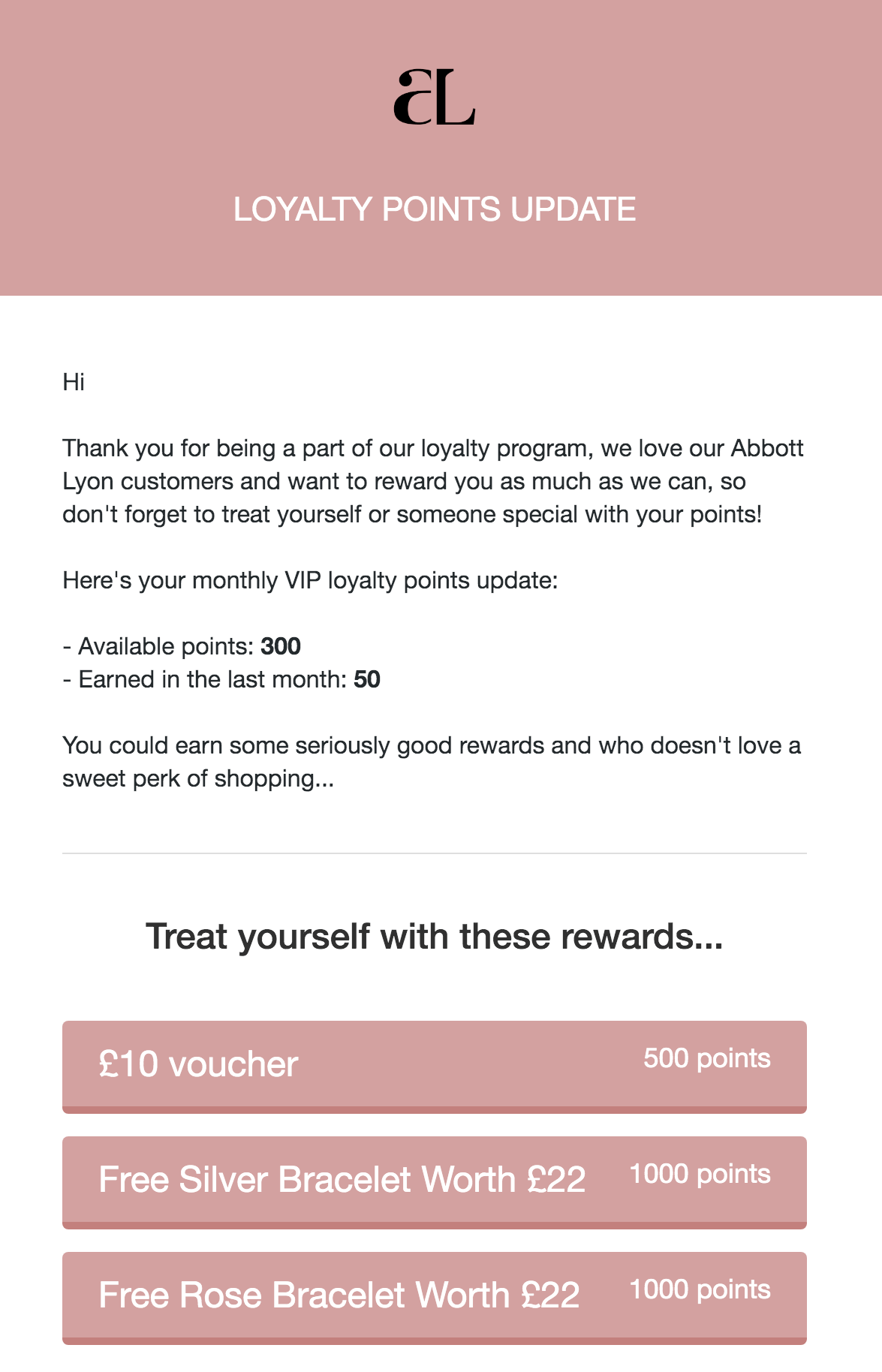
By giving their most loyal customers tangible benefits beyond just money off, Abbott Lyon is showing their customers that they care about them enough to give them a gift for free.
8. Never Fully Dressed
When Never Fully Dressed (NFD) met with LoyaltyLion, they already had an aspirational brand community, and it was growing fast. NFD’s team wanted to enhance their brand identity and values by growing their brand community.
To highlight their brand values and increase the repeat purchase rate, Never Fully Dressed designed an on-brand tiered loyalty program structure. Members can progress across three levels respectively; Something Sassy, Strikingly Sassy, and Supremely Sassy. To encourage their regular customers to purchase more often and spend more, NFD provides exclusive gifts as they move up to the next tier.
Using LoyaltyLion’s integration with Klaviyo, NFD encourages customer loyalty with their post-purchase emails, keeping customers engaged between purchases.
Thanks to their unique combination of financial and experience-based rewards, NFD generates 32% of its total revenue from its loyal customers today. They have also increased their member spend by 59% compared to non-redeeming members and increased their repeat purchase rates by 64%.
Key Elements of a Successful Fashion Loyalty Program
To create a loyalty program that not only attracts but retains customers, you need to carefully consider several key elements. Including these essential components can turn your fashion loyalty program into a customer magnet.
Create different reward tiers to motivate customers to reach higher spending levels. The key thing here is for brands to offer unique perks in their tiers to differentiate the loyalty program – for example, your top tier members could be invited to a panel where they get to influence which products are released next.
Points Expiry
A great way to win back customers who haven’t shopped with you for a while is ensuring that your points have an expiration date. This gives you the perfect opportunity to reach back out to your customers and let them know that they should shop with you before x amount of time or they’ll lose their benefits forever.
Double Points Events
Running promotional events – such as double or triple points weekends – is a great way to get your customers spending with you out of the peak seasons. This helps you even out your sales cycles so that you don’t see such steep peaks and troughs.
Free Shipping
When it comes to buying clothes online, shoppers have come to expect fast and free shipping. Working free shipping into your loyalty program is an effective way to get one-off shoppers to sign up to your program, meaning you can collect more data and deliver even better communications to them in future.
7 Steps to Creating Your Own Fashion Loyalty Program
Creating a fashion loyalty program from scratch requires careful planning and execution. Here’s a step-by-step guide to help you get started:
1. Define Your Objectives
Before diving into the details, it’s crucial to define the objectives of your loyalty program. What do you want to achieve? Common objectives include:
– Customer Retention: Increase customer loyalty and reduce churn rates.
– Sales Growth: Boost sales by incentivizing repeat purchases.
– Brand Advocacy: Encourage customers to become brand ambassadors and refer others.
– Data Collection: Gather valuable customer data for better marketing and personalization.
Clearly defining your objectives will guide every decision you make throughout the program’s development.
2. Choose Your Rewards
Decide on the rewards you’ll offer to your customers. Rewards are the heart of any loyalty program and can include things like:
– Discounts: Offering percentage or fixed discounts on future purchases.
– Free Products: Allowing customers to redeem points for specific items.
– Exclusive Access: Providing early access to sales, limited-edition products, or VIP events.
– Surprise Gifts: Sending unexpected gifts to loyal customers to create delightful moments.
Ensure that your rewards align with your brand and resonate with your target audience.
3. Choose a Loyalty Platform
Selecting the right technology to manage your loyalty program is crucial. Consider the following factors when choosing a loyalty platform:
– Integrations: Ensure the platform integrates seamlessly with your store and existing tech stack.
– User-Friendly: The platform should be easy for both customers and your team to use.
– Data Analytics: Access to customer data and analytics is essential for tracking program performance and making informed decisions.
– Scalability: Choose a platform that can grow with your business as your loyalty program expands.
4. Set Program Rules
Establish clear program rules and guidelines to avoid confusion. Define how customers earn points, how they can redeem rewards, and any terms and conditions associated with the program. Communicate these rules clearly on your website and promotional materials.
6. Launch and Promote Your Program
Once your loyalty program is set up, it’s time to launch and promote it. Use various channels, including your website, email marketing, social media, and in-store signage to inform customers about your program. Consider offering a sign-up bonus to incentivize initial participation.
7. Test and Iterate
After the program is live, continuously monitor its performance. Use data and feedback from customers to identify areas for improvement. Regularly assess whether the program is meeting its objectives and adjust as needed.
Ready to make loyalty marketing work for your fashion brand?
Fashion loyalty programs have proven time and again to be a catalyst for building lasting relationships with customers. By learning from iconic programs and following the steps outlined here, you can create a loyalty program that sets your brand on a path to long-term success.
So, what are you waiting for? Book a demo here.





